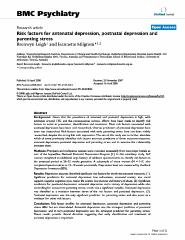Please use this identifier to cite or link to this item:
https://ahro.austin.org.au/austinjspui/handle/1/10590Full metadata record
| DC Field | Value | Language |
|---|---|---|
| dc.contributor.author | Leigh, Bronwyn | - |
| dc.contributor.author | Milgrom, Jeannette | - |
| dc.date.accessioned | 2015-05-16T00:05:51Z | - |
| dc.date.available | 2015-05-16T00:05:51Z | - |
| dc.date.issued | 2008-04-16 | - |
| dc.identifier.citation | Bmc Psychiatry 2008; 8(): 24 | en |
| dc.identifier.other | PUBMED | en |
| dc.identifier.uri | https://ahro.austin.org.au/austinjspui/handle/1/10590 | en |
| dc.description.abstract | Given that the prevalence of antenatal and postnatal depression is high, with estimates around 13%, and the consequences serious, efforts have been made to identify risk factors to assist in prevention, identification and treatment. Most risk factors associated with postnatal depression have been well researched, whereas predictors of antenatal depression have been less researched. Risk factors associated with early parenting stress have not been widely researched, despite the strong link with depression. The aim of this study was to further elucidate which of some previously identified risk factors are most predictive of three outcome measures: antenatal depression, postnatal depression and parenting stress and to examine the relationship between them.Primipara and multiparae women were recruited antenatally from two major hoitals as part of the beyondblue National Postnatal Depression Program 1. In this subsidiary study, 367 women completed an additional large battery of validated questionnaires to identify risk factors in the antenatal period at 26-32 weeks gestation. A subsample of these women (N = 161) also completed questionnaires at 10-12 weeks postnatally. Depression level was measured by the Beck Depression Inventory (BDI).Regression analyses identified significant risk factors for the three outcome measures. (1). Significant predictors for antenatal depression: low self-esteem, antenatal anxiety, low social support, negative cognitive style, major life events, low income and history of abuse. (2). Significant predictors for postnatal depression: antenatal depression and a history of depression while also controlling for concurrent parenting stress, which was a significant variable. Antenatal depression was identified as a mediator between seven of the risk factors and postnatal depression. (3). Postnatal depression was the only significant predictor for parenting stress and also acted as a mediator for other risk factors.Risk factor profiles for antenatal depression, postnatal depression and parenting stress differ but are interrelated. Antenatal depression was the strongest predictor of postnatal depression, and in turn postnatal depression was the strongest predictor for parenting stress. These results provide clinical direction suggesting that early identification and treatment of perinatal depression is important. | en |
| dc.language.iso | en | en |
| dc.subject.other | Depression.epidemiology | en |
| dc.subject.other | Depression, Postpartum.epidemiology | en |
| dc.subject.other | Female | en |
| dc.subject.other | Humans | en |
| dc.subject.other | Parents.psychology | en |
| dc.subject.other | Parity | en |
| dc.subject.other | Pregnancy | en |
| dc.subject.other | Pregnancy Complications.epidemiology.psychology | en |
| dc.subject.other | Prenatal Diagnosis | en |
| dc.subject.other | Questionnaires | en |
| dc.subject.other | Risk Factors | en |
| dc.subject.other | Socioeconomic Factors | en |
| dc.subject.other | Stress, Psychological.epidemiology | en |
| dc.title | Risk factors for antenatal depression, postnatal depression and parenting stress. | en |
| dc.type | Journal Article | en |
| dc.identifier.journaltitle | BMC psychiatry | en |
| dc.identifier.affiliation | Parent-Infant Research Institute | en |
| dc.identifier.affiliation | Clinical and Health Psychology | en |
| dc.identifier.doi | 10.1186/1471-244X-8-24 | en |
| dc.description.pages | 24 | en |
| dc.relation.url | https://pubmed.ncbi.nlm.nih.gov/18412979 | en |
| dc.type.content | Text | en |
| dc.identifier.orcid | 0000-0002-4082-4595 | en |
| dc.type.austin | Journal Article | en |
| local.name.researcher | Milgrom, Jeannette | |
| item.fulltext | With Fulltext | - |
| item.grantfulltext | open | - |
| item.cerifentitytype | Publications | - |
| item.openairetype | Journal Article | - |
| item.languageiso639-1 | en | - |
| item.openairecristype | http://purl.org/coar/resource_type/c_18cf | - |
| crisitem.author.dept | Parent-Infant Research Institute | - |
| crisitem.author.dept | Clinical and Health Psychology | - |
| Appears in Collections: | Journal articles | |
Files in This Item:
| File | Description | Size | Format | |
|---|---|---|---|---|
| 18412979.pdf | 247.63 kB | Adobe PDF |  View/Open |
Page view(s)
64
checked on Jan 14, 2025
Download(s)
146
checked on Jan 14, 2025
Google ScholarTM
Check
Items in AHRO are protected by copyright, with all rights reserved, unless otherwise indicated.
